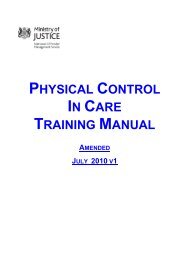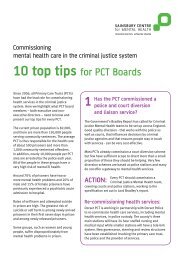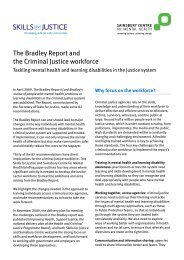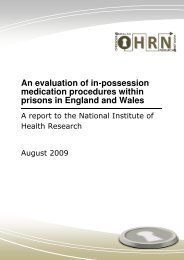Criminal justice liaison and diversion schemes - Offender Health ...
Criminal justice liaison and diversion schemes - Offender Health ...
Criminal justice liaison and diversion schemes - Offender Health ...
Create successful ePaper yourself
Turn your PDF publications into a flip-book with our unique Google optimized e-Paper software.
<strong>Criminal</strong> <strong>justice</strong> <strong>liaison</strong> <strong>and</strong> <strong>diversion</strong> <strong>schemes</strong>: A focus on women offendersReferences1 Reed J (1992) Review of <strong>Health</strong> <strong>and</strong> Social Services for Mentally Disordered<strong>Offender</strong>s <strong>and</strong> Others Requiring Similar Services London: HMSO.2 Home Office (1990) Circular 66/90 Provision for Mentally Disordered<strong>Offender</strong>s London: Home Office.3 Home Office (1995) Circular 12/95 Mentally Disordered <strong>Offender</strong>s: Interagencyworking London: HMSO.4 Edgar K (2004) Lacking Conviction: The rise of the women’s rem<strong>and</strong>population London: Prison Reform Trust.5 Department of <strong>Health</strong> (2005) <strong>Offender</strong> Mental <strong>Health</strong>care Pathway London:Department of <strong>Health</strong>.6 Sainsbury Centre (2006) London’s Prison Mental <strong>Health</strong> Services: A reviewLondon: The Sainsbury Centre.7 Care Services Improvement Partnership (2006) Women at Risk: The mentalhealth of women in contact with the judicial system London: Department of<strong>Health</strong>.8 Department of <strong>Health</strong> (2007) Improving <strong>Health</strong>, Supporting Justice: Aconsultation London: Department of <strong>Health</strong>.9 Baroness Jean Corston (2007) The Corston Report London: Home Office.10 Home Office (2004) Women’s Offending Reduction Programme Action PlanLondon: Home Office.11 Fawcett Society (2006) Doing Your Duty: Guide to the Gender Equality Duty,London: Fawcett Society.12 Fawcett Society (2006) Underst<strong>and</strong>ing Your Duty: Report on the GenderEquality Duty <strong>and</strong> the criminal <strong>justice</strong> system London: Fawcett Society.13 Howard League for Penal Reform (2006) Prison Information Bulletin 2:Women <strong>and</strong> girls in the penal system London: Prison Reform Trust.14 Women’s Estate Policy Unit (2003) Working with Women Prisoners London:Prison Service.15 Singleton N, Meltzer H, Gatward R, Coid J <strong>and</strong> Deasy D (1998) PsychiatricMorbidity Among Prisoners in Engl<strong>and</strong> <strong>and</strong> Wales London: The StationeryOffice.16 Rickford D (2003) Troubled Inside: Responding to the mental health needs ofwomen in prison London: Prison Reform Trust.17 Meltzer H, Jenkins R, Singleton N, Charlton J <strong>and</strong> Yar M (2003) ‘Non-fatalsuicide behaviour among prisoners’ International Review of Psychiatry, 15,pp. 148-149.18 Shaw J, Appleby L <strong>and</strong> Baker D (2003) A National Study of Prison Suicides1999-2000 London: Department of <strong>Health</strong>.19 Borrill J, Maden A, Martin A, Weaver T, Stimson G, Farrell M <strong>and</strong> Barnes T(2001) Differential Substance Misuse Treatment Needs of Women, EthnicMinorities <strong>and</strong> Young <strong>Offender</strong>s in Prison: Prevalence of substance misusetreatment needs London: Home Office.20 Centre for Public Innovation (2005) Court Diversion <strong>and</strong> Liaison Schemes:Recommendations for models of care London: Centre for Public Innovation.21 Department of <strong>Health</strong> (2003) Mainstreaming Gender <strong>and</strong> Women’s Mental<strong>Health</strong>: Implementation Guide London: Department of <strong>Health</strong>.22 Nacro (2005) Findings of the 2004 Survey of Court Diversion/<strong>Criminal</strong>Justice Mental <strong>Health</strong> Liaison Scheme for Mentally Disordered <strong>Offender</strong>s inEngl<strong>and</strong> <strong>and</strong> Wales London: Nacro.23 Nacro (2006) Liaison <strong>and</strong> Diversion Schemes for Mentally Disordered<strong>Offender</strong>s: A mental health good practice guide London: Nacro.24 Birmingham L (2001) ‘Diversion from custody’ Advances in PsychiatricTreatment, 7, pp. 198-207.Do you need this leafletin another format?Ring 020 7840 7220.Nacro’s Mental <strong>Health</strong> UnitNacro believes that responses to offenders withmental health needs should focus on their care <strong>and</strong>treatment rather than on punishment. To help bringabout this change, Nacro campaigns for: more effective working partnerships betweenagencies the development of specialist skills in the criminal<strong>justice</strong> system better information sharing the education <strong>and</strong> training of staff so that theyhave the skills <strong>and</strong> encouragement they need towork with a group who can be difficult <strong>and</strong>unrewarding.Nacro’s Mental <strong>Health</strong> Unit has been working to tackleproblems faced by offenders with mental healthneeds since 1990. We work with government agenciesat a national <strong>and</strong> local level to develop more effectiveways to deal with offenders with mental health needs.We provide a range of services: information <strong>and</strong>advice; policy development <strong>and</strong> other consultancyservices; <strong>and</strong> training. We also run a major annualconference on mental health <strong>and</strong> crime.Nacro has a specialist mental health websitewhich offers information <strong>and</strong> support for practitioners<strong>and</strong> policy makers working in the field of criminal<strong>justice</strong> <strong>and</strong> mental health. To find out more, visit thewebsite or contact the Mental <strong>Health</strong> Unit on 020 78401209 or email mentalhealth@nacro.org.uk.www.nacromentalhealth.org.ukICPRThe Institute for <strong>Criminal</strong> Policy Research (ICPR)carries out multi-disciplinary research into crime <strong>and</strong>the criminal <strong>justice</strong> system. We produce work whichis independent <strong>and</strong> objective. Our key audiences aremanagers <strong>and</strong> practitioners within the criminal <strong>justice</strong>system, other professionals working with offenders,<strong>and</strong> politicians <strong>and</strong> their advisors. Our researchapproaches incorporate both quantitative <strong>and</strong>qualitative methods. Our main areas of researchinclude:the quality <strong>and</strong> effectiveness of public services<strong>and</strong> resources (including police, probation <strong>and</strong>services for offenders <strong>and</strong> drug users)the causes, consequences <strong>and</strong> prevention ofoffendingpublic attitudes towards crime <strong>and</strong> sentencing,the police <strong>and</strong> community safety.www.umds.ac.uk/schools/law/research/icpr/12
















